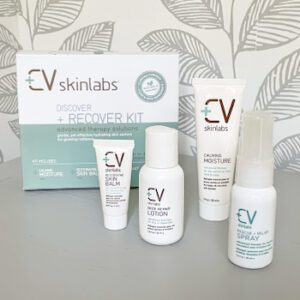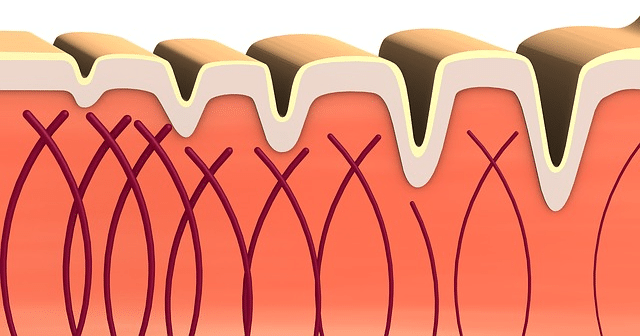[ad_1]
Can you regain skin elasticity after you’ve lost it?
Let’s find out.
What Is Skin Elasticity?
Take a moment to pinch the skin on the back of your hand. Then let it go. See it snap back into place? That’s skin elasticity.
It’s your skin’s ability to snap back into place after it’s been stretched. It shows up when you smile and then stop smiling. The skin moves back into place. Or when you frown and then stop frowning.
Stretch and bounce back. That’s what skin elasticity is all about. Unfortunately, as we age, the skin often loses some of this ability. That’s when wrinkles, sagging, and crinkles set in.
Why We Ask: Can You Regain Skin Elasticity?
If you’re noticing more wrinkles and sagging, you’re probably wondering what’s going on, and if you can do anything about it.
Skin with high elasticity is plump, firm, and youthful in appearance. Scientists most often credit two proteins as providing the skin’s structure and firmness:
- Collagen: Collagen is an abundant protein in the body. It supports your body’s tissues, essentially holding your body together. About 80 percent of the outer layer of skin is made up of collagen. It provides strength to the skin.
- Elastin: This is another protein that gives your skin the ability to stretch and bounce back. It works closely with collagen to maintain the skin’s structure and keep it looking healthy and youthful.
As we get older, a couple of things happen that can damage skin’s elasticity:
- The body produces less collagen and elastin. After the age of 20, the skin gradually begins producing less collagen and elastin.
- Accumulative damage: Factors like UV rays, environmental assaults, and more cause damage to the elastin and collagen you have.
Of the two of these, cumulative damage tends to be more destructive to the skin than our gradual slowing of collagen and elastin production, though both play a role in accelerating the appearance of aging.
What Causes Damage to Skin’s Elasticity?
Collagen and elastin structures change with age. Collagen fibers flatten out and elastin fibers thicken. Gradually, the net-like design that these two fibers create thins out, creating that thinner, less plump, more wrinkled look.
The main factors involved in damaging these proteins include:
- Sun exposure: This is considered the most important environmental factor causing skin aging. Exposure to UV rays increases the production of free radicals—destructive molecules that damage DNA and skin cells and fibers.
- Cigarette smoke: Cigarette smoke, including secondhand smoke, increases free radical damage.
- Pollution: Toxins in the air coming from factory smoke and smog can induce free radical damage.
- Poor skincare: Poor skin care habits can also lead to loss of skin elasticity. Forgetting to wash your face at night, for instance, can clog your pores, leading to breakouts and scarring. Failing to moisturize appropriately can lead to dryness and a damaged skin barrier, which can expose the skin to attack from free radicals.
- Poor diet: Fast foods, fried foods, and high-sugar items can all contribute to inflammation in the skin, which damages all structures, including elastin.
- Lack of sleep: Sleep deprivation can lead to increased fine lines and wrinkles. It increases inflammation, reduces skin repair, and increases stress, which also damages the skin.
- Chronic stress: Chronic stress breaks down collagen and elastin, leading to accelerated aging.
 Skincare Ingredients That Can Help You Regain Skin Elasticity
Skincare Ingredients That Can Help You Regain Skin Elasticity
Several ingredients are known to help either preserve or stimulate renewed skin elasticity.
- Aloe vera: It has malic acid, which improves the elasticity of the skin.
- Reishi mushroom: Contains lysine, which reinforces skin elasticity and support. It’s also a powerful anti-inflammatory, which can help prevent damage to elastin fibers.
- Turmeric: A powerful anti-inflammatory and antioxidant, it protects the sun, pollution, and other environmental assaults from negatively impacting your skin’s elasticity.
- Bega-glucan: It penetrates deeply into tissues, stimulating collagen synthesis and helping increase the skin’s elasticity.
- Sunflower oil: Rich in vitamin E, this is a powerful antioxidant that locks moisture into the skin while promoting collagen and elastin production.
- Chamomile extract: Contains levomenol, a natural moisturizing agent that improves elasticity.
- Shea butter: In addition to being a powerful moisturizer, shea butter also boosts the production of collagen.
You may not be surprised to learn that our CV Skinlabs products contain all of these ingredients. Use them regularly to see improvements in your skin’s elasticity!
Can You Regain Skin Elasticity?
You can also make some changes in your daily routine that will help preserve the skin elasticity you have while also helping to stimulate new elastin production.
1. Consider Collagen Supplements
Some small studies suggest that collagen supplements may help boost collagen production and improve skin elasticity and firmness. In a 2018 study, for instance, those who took one for 12 weeks experienced a significant improvement in firmness and elasticity as well as an increase in skin thickness.
Understand, however, that these studies are small so we need more research to be sure of these effects. Other ingredients were also used in the supplement, including vitamin C and some plant extracts.
2. Use a Retinol Product
Retinol is a form of vitamin A that is found in many skincare products. We have some evidence that topical retinol combined with vitamin C can help replenish skin elasticity.
3. Exfoliate Regularly
As we age, the skin’s ability to shed old skin cells and produce new ones slows down. Regular exfoliation helps remove accumulated dead skin cells, allowing new cells to come forth. It can also increase collagen production and promote skin elasticity.
4. Use Topical Vitamin C
Vitamin C helps promote collagen production while simultaneously inhibiting those enzymes that break down collagen in your skin.
5. Eat a Healthy Diet
If you eat too many fast foods, fried foods, and high-sugar foods, you are stimulating inflammation in your body. Inflammation signals specific enzymes to break down elastin and collagen in the skin. Consume more fruits and vegetables, healthy fish, nuts, and olive oil. It’s also important to drink enough water to keep your skin hydrated from the inside out.
6. Get Enough Sleep
Scientists recommend at least 7-8 hours of sleep per night. This helps restore and rejuvenate your skin and gives your skin a chance to repair any damage that occurred during the day.
7. Use Sunscreen
Protect your skin’s elasticity from damage by the sun by protecting your skin from harmful UV rays. Use clothing, shade, and umbrellas, and apply a broad-spectrum sunscreen every day.
Have you noticed changes in your skin’s elasticity?
[ad_2]

